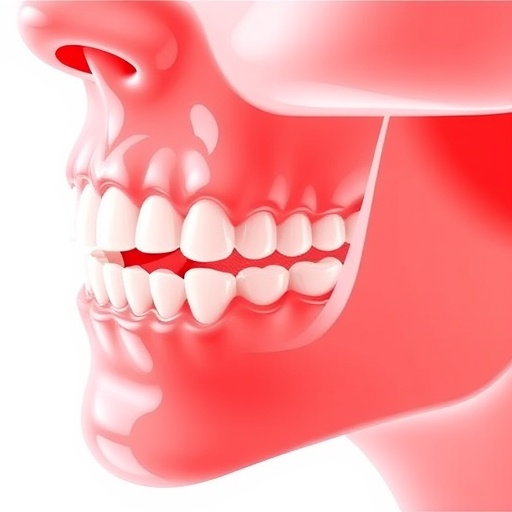
Oral cavity squamous cell carcinoma (OCSCC) remains a formidable challenge in oncology due to its high rates of morbidity and mortality worldwide. The unpredictable nature of its progression necessitates reliable prognostic tools capable of guiding clinical decision-making, particularly in post-surgical contexts. A new study published in BMC Cancer brings the Naples Prognostic Score (NPS) to the forefront as a promising biomarker that could revolutionize the way clinicians predict outcomes for patients undergoing surgical treatment for OCSCC.
This retrospective investigation analyzed data from a substantial cohort of 589 patients treated over an 11-year period across two prominent regional medical centers in central China. The comprehensive dataset allowed for robust examination of various clinicopathological factors, incorporating demographic information alongside tumor-specific details, and crucially, a spectrum of nutritional and inflammatory markers. By leveraging these variables, the researchers sought to elucidate how preoperative NPS correlates with both disease-free survival (DFS) and overall survival (OS).
The Naples Prognostic Score is a composite index reflecting systemic inflammatory responses and nutritional status, parameters increasingly recognized for their significance in cancer progression. It integrates neutrophil-to-lymphocyte ratios, serum albumin, and levels of cholesterol among other factors, representing a multidimensional perspective on a patient’s biological resilience. Its predictive capacity has been explored in several malignancies, but its significance in OCSCC has, until now, remained under-evaluated.
Employing rigorous univariate and multivariate Cox regression analyses, the study identified several independent prognostic factors. These included surgical margin status, extranodal extension (ENE), the NPS itself, the age-adjusted Charlson Comorbidity Index (ACCI), and the American Joint Committee on Cancer (AJCC) staging. Notably, NPS emerged as a potent independent predictor for both DFS and OS, underlining its utility as a stratification tool in clinical practice.
The correlation between a higher NPS and poorer survival outcomes was particularly compelling. This relationship highlights the dual impact of systemic inflammation and nutritional deficits in promoting tumor aggressiveness and diminishing patient resilience after surgery. By quantifying this risk through NPS, clinicians may better identify those patients at greater likelihood of recurrence or mortality.
Another critical dimension of this study relates to the role of adjuvant radiotherapy in enhancing survival outcomes. Kaplan-Meier survival analyses demonstrated that patients with advanced-stage disease (AJCC stage III-IVb) and intermediate to high NPS (scores 1–4) derived significant survival benefits from postoperative radiotherapy. This nuanced insight can be transformative, as it suggests that NPS not only forecasts prognosis but also helps tailor adjuvant therapeutic strategies, potentially sparing lower-risk individuals from unnecessary radiation exposure.
Conversely, patients with early-stage tumors (AJCC stage I-II) or a zero NPS score did not show significant survival improvement when subjected to adjuvant radiotherapy. This raises important questions about overtreatment in this subgroup and reaffirms the need for personalized treatment regimens. The inclusion of NPS in treatment algorithms could optimize therapeutic efficacy and reduce morbidity associated with aggressive interventions.
The interplay of other prognostic markers, such as ECOG Performance Status and ACCI, alongside NPS, enhances the fidelity of survival predictions. ECOG Performance Status, assessing patient functional capacity, and ACCI, evaluating comorbidities, provide contextual understanding of patient resilience independent of tumor biology. Their inclusion strengthens prognostic models by addressing the holistic patient profile, an approach increasingly embraced in oncology.
This study’s methodological rigor, involving a large, well-characterized patient population and sophisticated statistical modeling, lends substantial credibility to its conclusions. The length and breadth of the data collection period spanning over a decade allow for meaningful long-term survival analysis, adding depth to the prognostic insights gleaned.
Emerging evidence from this work advocates for the integration of NPS assessments into routine preoperative evaluations. Such practice could facilitate stratified risk evaluation, guiding surgeons and oncologists in making informed decisions regarding the necessity and intensity of adjuvant therapies. It also opens avenues for closer postoperative surveillance in high-risk groups, potentially enabling timely interventions upon disease recurrence.
Moreover, the study propels forward the understanding of the biological mechanisms underlying OCSCC progression. Systemic inflammation, as captured by NPS components, is increasingly implicated in modulating the tumor microenvironment, enhancing angiogenesis, immune evasion, and metastatic potential. Nutritional status further impacts immune competence and wound healing, suggesting that interventions aimed at modifying these factors preoperatively might improve patient outcomes.
The practical implications of incorporating NPS are significant, particularly in regions where resource allocation and treatment personalization are critical. This score offers a cost-effective, readily accessible means of risk stratification, as it depends on routine laboratory parameters often available in most clinical settings.
Beyond its immediate clinical utility, the findings stimulate important questions for future research. Prospective studies validating NPS in diverse populations and investigating the potential benefits of nutritional and anti-inflammatory interventions tailored based on NPS are warranted. In addition, integrating NPS with emerging molecular and genetic biomarkers could refine prognostic models further.
The compelling evidence presented by Xu, Wu, and Cheng sets a new standard for preoperative oncological assessment in OCSCC. Their work exemplifies how combining systemic inflammatory markers with traditional clinical parameters yields powerful tools to predict patient trajectories and tailor therapies effectively.
In conclusion, the Naples Prognostic Score emerges as a vital prognostic indicator with significant implications for managing oral cavity squamous cell carcinoma. Its adoption in clinical workflows promises enhanced precision in prognostication and therapeutic decision-making, ultimately aiming to improve patient survival and quality of life.
Subject of Research: Prognostic value of the preoperative Naples Prognostic Score in predicting disease-free and overall survival in patients with oral cavity squamous cell carcinoma undergoing surgery.
Article Title: Prognostic significance of preoperative Naples prognostic score for disease-free and overall survival in oral cavity squamous cell carcinoma post-surgery
Article References:
Xu, XL., Wu, CC. & Cheng, H. Prognostic significance of preoperative Naples prognostic score for disease-free and overall survival in oral cavity squamous cell carcinoma post-surgery. BMC Cancer 25, 757 (2025). https://doi.org/10.1186/s12885-025-14146-4
Image Credits: Scienmag.com
DOI: https://doi.org/10.1186/s12885-025-14146-4
Tags: biomarkers for cancer prognosiscancer survival predictorsclinicopathological factors in oncologydisease-free survival in oral cancerneutrophil-to-lymphocyte ratio significancenutritional status and cancer outcomesoral cavity squamous cell carcinoma prognosisoverall survival in OCSCCpreoperative Naples Prognostic Scoreretrospective study in cancer researchsurgical treatment outcomes for oral cancersystemic inflammatory response in cancer





